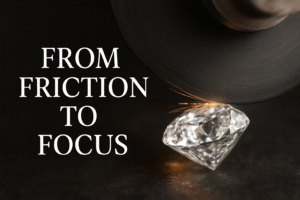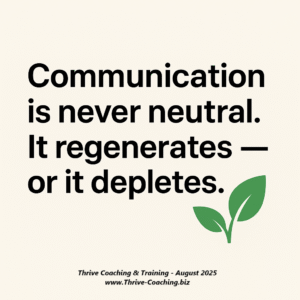 Deconstructing Common Narrative Traps – Are Old Stories Holding You Back? Let’s Rewrite Them.
Deconstructing Common Narrative Traps – Are Old Stories Holding You Back? Let’s Rewrite Them.
In last week’s Thought for the Week, we explored the profound impact of what we say and how we say it. If you missed it, you can catch up here
Today, we’re going to take that concept a step further and shine a light on some of the deeply ingrained narratives that subtly (or not-so-subtly) shape our world. These are the stories we’ve heard so often they feel like undeniable truths, yet often, they are traps that limit our potential for connection, growth, and genuine regeneration.
Let’s deconstruct two prevalent examples and then explore how we can reframe them with a regenerative lens.
Narrative Trap 1: “Pull Yourself Up by Your Bootstraps”
This phrase, while often associated with American individualism, expresses a sentiment of self-reliance that we certainly recognise here in Great Britain and Guernsey. It suggests that anyone can succeed if they just work hard enough, without any external help. On the surface, it champions grit and personal endeavour.
Yet, when you really think about it, this message often brushes aside big issues like unfair systems, unequal chances, and our very human need for support and community. Whilst that was the original joke, we know that we can’t actually ‘pull ourselves up by our bootstraps’! It highlights just how unrealistic it is to expect people to succeed entirely on their own, without any leg-up or help along the way.
How the Language Perpetuates the Trap:
- Implies Sole Responsibility: The phrase places the entire burden of success or failure squarely on the individual. If you haven’t “pulled yourself up,” it implies a lack of effort or will, rather than acknowledging external challenges that might be at play.
- Ignores Systemic Context: It completely overlooks the societal structures, privileges, or disadvantages that significantly impact an individual’s starting point and journey.
- Fosters Isolation: It subtly discourages asking for or offering help, framing reliance on others as a weakness rather than a strength.
Regenerative Reframing: From Isolation to Interdependence
Instead of a solitary struggle, a regenerative perspective acknowledges that true flourishing often arises from connection and mutual support.
- Alternative Framing: “Building bridges, lifting each other up” or “Standing on our own two feet, together.“
- The Regenerative Message: This reframing emphasises collaboration, community, and the idea that collective effort creates stronger, more resilient outcomes. It recognises that while individual effort is vital, it thrives within a supportive ecosystem. It’s about recognising available resources and support systems, and leveraging them to achieve goals, rather than pretending they don’t exist or aren’t needed.
Narrative Trap #2: “Nice Guys Finish Last“
This narrative is undeniably familiar in Great Britain too, often cropping up in discussions about dating, career progression, or competitive environments. It suggests that kindness, integrity, and empathy are hindrances to success. It implies that to “win,” one must be ruthless, self-serving, or even manipulative.
How the Language Perpetuates the Trap:
- Creates a False Dichotomy: It pits “niceness” against “success,” suggesting they are mutually exclusive. This can force individuals to choose between their values and their ambitions.
- Glorifies Aggression / Selfishness: By implying that “last place” is the fate of the kind, it inadvertently promotes more aggressive or less ethical behaviours as the path to victory.
- Misinterprets “Nice”: Often, the “nice guy” who “finishes last” is actually someone who is overly passive, lacks boundaries, or struggles with genuine confidence, rather than someone who is genuinely kind and assertive. True kindness, coupled with strength and clear communication, is a powerful asset.
Regenerative Reframing: From Scarcity to Sustainable Success
A regenerative approach understands that sustainable success is built on trust, strong relationships, and ethical practices.
- Alternative Framing: “Integrity Leads to Lasting Impact” or “Purposeful Kindness Paves the Way.”
- The Regenerative Message: This perspective highlights that while short-term gains might sometimes be achieved through less ethical means, true and enduring success – the kind that builds a legacy and fosters genuine well-being – is rooted in integrity, empathy, and strong relationships. It’s about recognising that being a “good person” can lead to the “real prize” in life, such as fulfilling relationships and a sense of purpose.
The Path Forward: Conscious Communication
Deconstructing these narrative traps is the first step. The next is to consciously choose and cultivate regenerative language in our daily lives. This means:
- Questioning Assumptions: When you hear a common saying, pause and consider its underlying message. Does it truly serve a connected, thriving world?
- Emphasising Interdependence: Look for opportunities to highlight collaboration, community, and mutual support.
- Celebrating Ethical Strength: Champion stories where integrity and kindness lead to meaningful, sustainable success.
By actively engaging in regenerative communication, we not only reshape our own understanding but also contribute to a broader cultural shift towards more life-affirming and empowering narratives. This is how we prepare the soil, choose seeds that help each other grow, and ensure our shared garden becomes healthier and more vibrant over time.
“Begin challenging your assumptions. Your assumptions are the windows on the world. Scrub them off every once in a while, or the light won’t come in.”
– Alan Alda –
[A six-time Emmy Award and Golden Globe Award winner and a three-time Tony Award nominee, he portrayed Captain Benjamin Franklin “Hawkeye” Pierce in the CBS wartime sitcom M*A*S*H.]
Have a great week full of new bright and meaningful connections!
With warmest wishes,

Korinne Le Page
Thrive Coaching & Training – Empowering You to Thrive!
Not yet subscribed to Thrive? Join here to receive weekly reflections and prompts: Subscribe to Thrive
P.S. Feel free to share your experiences and insights!
P.P.S. Book a complimentary Clarity Session with me here
#ThoughtForTheWeek #Communication #GrowthMindset #Leadership #HumanSkills #trust #transformation


 Thought for the Week – From Trust to Transformation: Is trust the soil where transformation takes root?”
Thought for the Week – From Trust to Transformation: Is trust the soil where transformation takes root?” 

 Thought for the Week – From Friction to Focus: Ever noticed how your sharpest insights often come after your toughest conversations?
Thought for the Week – From Friction to Focus: Ever noticed how your sharpest insights often come after your toughest conversations?  When have you learned more from a disagreement than from an agreement?
When have you learned more from a disagreement than from an agreement? What ripples out after you’ve left the room?
What ripples out after you’ve left the room? Think back to the last conversation you had that left you energised …
Think back to the last conversation you had that left you energised …  What’s one “human skill” you think will be even more valuable in five years than it is today?
What’s one “human skill” you think will be even more valuable in five years than it is today? When did clear, thoughtful writing start sounding “too AI”?
When did clear, thoughtful writing start sounding “too AI”?